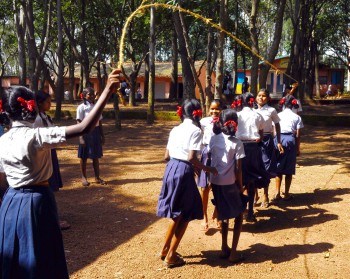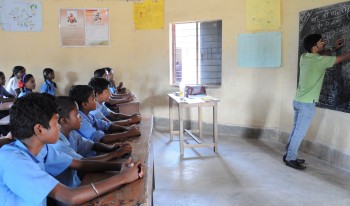
ICRW at 40: Celebrating Programs Tackling Inequality and Violence in Asia
29 February 2016
Media Contact
For the past 40 years, ICRW has been at the forefront of identifying and documenting some of the most effective ways to end gender discrimination. We’ve uncovered the most pressing, little known challenges faced by women and girls and have helped guide the conversation on why engaging men and boys – nearly half the population – is so critical to achieving gender equality and eliminating poverty.
 Our research has told us, over and over again, that men and boys must be engaged in efforts to change norms and behaviors, and indeed policies, which will empower women and give them the agency to tackle poverty in their community. And research also tells us that the key to shifting gender norms and uprooting discriminatory behavior is best done when people are young and their beliefs are still developing. Developing a program that combines these two evidence-based approaches provides us with an innovative approach: educating and empowering a generation of boys who challenge discrimination against girls when they see it, push back against violence in their homes and in public, and believe that girls are nothing less than their equals. This is the theory behind ICRW’s Gender Equity Movement in Schools (GEMS) program.
Our research has told us, over and over again, that men and boys must be engaged in efforts to change norms and behaviors, and indeed policies, which will empower women and give them the agency to tackle poverty in their community. And research also tells us that the key to shifting gender norms and uprooting discriminatory behavior is best done when people are young and their beliefs are still developing. Developing a program that combines these two evidence-based approaches provides us with an innovative approach: educating and empowering a generation of boys who challenge discrimination against girls when they see it, push back against violence in their homes and in public, and believe that girls are nothing less than their equals. This is the theory behind ICRW’s Gender Equity Movement in Schools (GEMS) program.
The GEMS program was first implemented in public schools in Mumbai, between 2008 and 2010, reaching more than 8,000 boys and girls ages 12 to 14 across the city. ICRW and our partners, the Committee of Resource Organizations for Literacy (CORO) and the Tata Institute for Social Sciences (TISS), implemented the programs in public schools, because schools are uniquely positioned to shape and influence children’s understand of their surroundings and gender constructs. And given that children spend such big chunks of time in school, and in the presence of their peers, it made sense to meet children where they are: in schools.
Teachers were engaged in discussions around gender equality and trained to facilitate a curriculum during the school day that begins to engage students in discussions and group exercises to challenge the way they think about gender roles. These discussions include questions about gender, gender-based violence, the division of work between girls and boys, and dynamics within friendships and relationships.
Researchers at ICRW conducted an assessment of the program, finding that GEMS had an impact on how boys and girls view gender norms and violence. Our analysis showed the recognition of different forms of violence and gradual decline in the perpetration of physical violence, with improved willingness to inform on perpetrators among boys and girls who participated in the program. In the schools where the GEMS program was implemented, the percentage of students who reported perpetrating violence on fellow students went down. Overall, we found that students who participated in GEMS were better able to deal with conflict without using violence after second year of intervention. For example, we found that more students expressed an intention to intervene when witnessing any form of violence.
 Attitudes of students towards traditional roles of women and girls, particularly among girls, also changed – and substantially. The proportion of girls disagreeing with the statement “Bathing and feeding kids are the mother’s responsibility” increased from 13 percent to 41 percent throughout intervention schools, while no significant change was observed in comparison schools.
Attitudes of students towards traditional roles of women and girls, particularly among girls, also changed – and substantially. The proportion of girls disagreeing with the statement “Bathing and feeding kids are the mother’s responsibility” increased from 13 percent to 41 percent throughout intervention schools, while no significant change was observed in comparison schools.
Recognizing the value and success of GEMS, government of Maharashtra, India, adapted and scaled-up in around 20,000 schools. This is also being piloted in 55 schools in Vietnam and 350 schools in Bangladesh. In addition, ICRW is currently implementing the program in a rural context, in the eastern state of Jharkhand.
GEMS is a series of steps forward, but it’s not a silver bullet that will tackle all inequalities prevalent in society in just one school lesson. Rather it’s a way to start unpacking what has underpinned discrimination against girls for decades, how these norms condones boys to take risk and perpetuate violence. And at that, it’s succeeding.
ICRW will continue to track the success of the program and share lessons learned with the development community so that we can ensure that programs that are effective are taken to scale, impacting more students, bringing down rates of violence, and empowering a more gender equal generation of boys and girls in the years to come.
The full GEMS curriculum is available and online, so practitioners, teachers, or parents can download and implement the program within their own country context. Our training manual helps guide facilitators and the curriculum provides examples of lessons and discussions to begin to unpack the deep-seated discriminatory norms that have perpetuated discrimination and violence for far too long.
